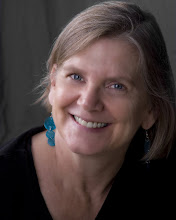"Life changes in an instant," is the second line of Joan Didion's memoir, The Year of Magical Thinking, and the title of an article in my local paper, announcing that Didion is speaking on our campus Tuesday night. The Writing From Personal Experience workshop that normally meets at my house on Tuesdays will get together and go to the talk instead.
I gave this assignment/suggestion: use as a prompt anything that strikes you about the evening--our carpooling, walking to campus from town, the conversation you overhear waiting in line, Joan Didion's body language, the hat the person seated in front of you is wearing, etc.
What a relief: the workshop isn't school, where the assignment might be to go hear a lecture and write critically about what the speaker discusses. Sure, there's a place for that, but we're not covering the Didion event for the newspaper. We can write about what moves us, what we notice, a gesture that triggers memory. And anyway, I'm always attracted to journalism that include a careful intrusion of first-person experience.
The next time you're at an event, try this: write about what ignites your imagination. Watch yourself meander on the page. Have fun. Remember: writing isn't (anymore) homework.
Monday, February 27, 2006
Tuesday, February 21, 2006
Stick to the Writing
When people write about intensely personal matters, it's tempting sometimes to stray into the psychology surrounding the situation. Let's say the writing's about the demise of a marriage, the demands of an elderly parent, alcoholism, or the loss of a life dream. A listener may feel triggered or may want to offer advice, support, a similar story from his/her life. But the focus always, in a writing group, must stay on the writing itself--the story, the words the writer has committed to paper. What works? What's memorable? What could use tweaking?
Some workshops treat everything written as fiction and refer to the writer as the narrator--it's not YOUR grandmother, it's THE grandomther.
Since I teach writing from personal experience I don't set up my workshops that way. But we all need to remember that this is not group therapy; it's a writing group.
Some workshops treat everything written as fiction and refer to the writer as the narrator--it's not YOUR grandmother, it's THE grandomther.
Since I teach writing from personal experience I don't set up my workshops that way. But we all need to remember that this is not group therapy; it's a writing group.
Thursday, February 16, 2006
Voicing the Voice
One of my students has been grappling with her writerly voice. She doesn't hear a voice in her head when she writes. What is voice?, she asked in class. We discussed this--some people actually hear a voice in their heads. Some writers have distinct voices, like Hemingway--always--and Kaye Gibbons in Ellen Foster. Voice can be elusive, hard to pinpoint, similar to tone. The best advice I can offer for finding your voice is to write, a lot. Free write for ten minutes a day and just let the words flow. Try not to censor or audition words as you go along. I invite you to respond to this blog with a freewrite. Let the first words that come to mind come out. Ready Set. Go!
Subscribe to:
Posts (Atom)
